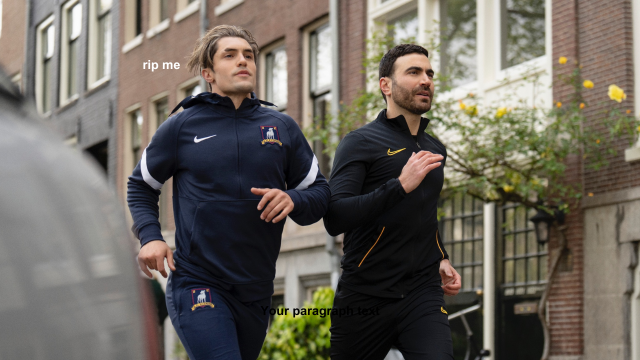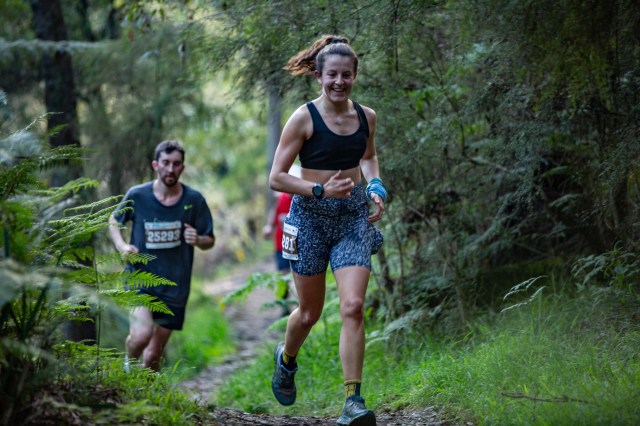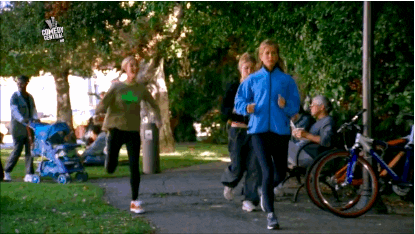
In many areas of my life, I am delusional. No idea how we’re going to save for that dream holiday next year? Let’s make a mood board. Have been invited to four events on the one night? Say yes to all of them and make it work, girl.
The one area you can’t be totally delusional about is fitness. Despite this, I try.
That’s why I signed up for a 14-kilometre trail run at this year’s Great Ocean Road Running Festival. Sure, I haven’t run more than four kilometres in months but I completed a half marathon in 2021! That’s got to count for something, right?
As the race approaches, I spoke with Australian distance runner, running coach and Brooks ambassador Melissa Duncan to hear her tips on how to pound the pavement again.
We were on a break
Firstly, Melissa says to narrow down why you’ve stopped running in the first place.
“If you’ve stopped running because of an injury, then you definitely need to see a physio to make sure you have a proper return to running plan.”
If, like me, you’ve just been lazy or life’s gotten in the way, then Melissa recommends starting slowly, preferably with a running coach.
Melissa has seen people go from not being able to run for more than one minute at a time to doing an 8-kilometre fun run in the space of six to eight months. HUGE.
Melissa says that having a tailored training plan uniquely to you can help your body and lifestyle adapt to what you really need.
The most common injuries
I have a friend who ran a full marathon on a whim (with no training) after a night out. Don’t be like them, because chances are, you will do yourself an injury.
Melissa says the most common injuries that runners may suffer from are runner’s knee (a dull pain around the front of the knee that’s caused by your cartilage being overused as a shock absorber) as well as shin splints (another overuse injury that causes pain around the shin bone).
“There’s been a really big increase in those two injuries since COVID,” says Melissa.
“The gyms were closed, all sports were cancelled so people picked up their shoes and started running.”
If you find your knees or legs aching, Melissa shares that strapping techniques may help but to be proactive, “It’s all about load management and making sure that you’re building up gradually and not making any drastic changes.”
It’s also important to watch the surfaces you’re running on and make sure it varies.
Melissa notes you don’t want to be “running on hard surfaces or roads all the time.”
This means that trail runs like the Great Ocean Road Running Festival’s 12 and 14 kilometre races are softer on your bones and joints.

Complementary exercises
Despite what you may think, being a runner doesn’t mean banking the kilometres up every day. To really up-level or to start back again after a hiatus, making sure you warm up and down properly and include strength training like pilates into your routine is super important.
As a professional runner, Melissa notes that pilates is one of the biggest things that helped with a serious hamstring injury. She couldn’t run for three and a half months (a huge amount of time for a professional athlete) but being patient, implementing pilates and holding back for longer than she thought she’d need to means that Melissa is running the 14-kilometre race and is even holding a warm-up activation for the half marathon runners.
And look, if professional athletes add this to their routines, us novices probably should too.
Melissa’s parting words aren’t about smashing personal records or pushing your body to do more than it’s ready to. Rather, Melissa recommends consistency.
“I cannot stress the importance of consistency enough. So don’t expect things to happen immediately. Don’t try to chase the instant gratification in terms of results for your running because it’s all about being slow and steady and chipping off bit by bit.”
By creating daily habits and weekly routines, Melissa shares that this consistency is what will help you enjoy running and achieve the results you actually want.








